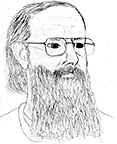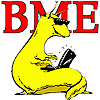
|
| SoE home |

|
| Kevin Karplus's home page |

|
| Biomolecular Engineering Department |
Instructor:
Lectures: MW 17:00–18:45 Social Sciences 2, room 171.
Final exam slot: Thursday 2014 March 19:30—22:30p.m.
There will be no required texts this quarter, but students may need to consult writing and document-design books. I particularly recommend the following books:
This text (which used to be used in CMPE 185) has some excellent chapters on organizing your writing for readability. Also, in the past, several students have had grammatical problems that are well addressed in the chapters for non-native speakers.
Short, easy reading, and generally good advice about making writing readable.
LaTeX is the document-preparation system of choice for computer scientists, mathematicians, and physicists. If you need to put math in your writing, nothing else does as well. Not bad for free software. And your documents are still usable 10–20 years later, unlike with proprietary word-processing systems.
Excellent advice for including graphics in documents when you really need the graphics to convey information, not just be decorations. Tufte has 3 more recent books in print, which are almost as good.
All students are expected to keep individual lab notebooks of their work, and keep them up to date. Bring these to class each week and to each individual meeting.
Every two weeks a written draft of the senior thesis is due. Each draft should incorporate additions and corrections since the previous one, plus a cover memo listing the main differences. Don't forget to date every draft and have page numbers on every page (except title page).
The class has been divided into three groups (Early, Middle, and Late), with one-third of the class turning in drafts each week, in order to level out the load on the instructor.
| Date due | Group | Date returned |
|---|---|---|
| Wed 2015 Jan 7 | E | Wed 2015 Jan 14 |
| Wed 2015 Jan 14 | M | Wed 2015 Jan 21 |
| Wed 2015 Jan 21 | L | Wed 2015 Jan 28 |
| Wed 2015 Jan 28 | E | Wed 2015 Feb 4 |
| Wed 2015 Feb 4 | M | Wed 2015 Feb 11 |
| Wed 2015 Feb 11 | L | Wed 2015 Feb 18 |
| Wed 2015 Feb 18 | E | Wed 2015 Feb 25 |
| Wed 2015 Feb 25 | M | Wed 2015 Mar 4 |
| Wed 2015 Mar 4 | L | Wed 2015 Mar 11 |
| Th 2015 Mar 19 7:30 p.m. | all |
| Early | Middle | Late |
|---|---|---|
| Emmanuel | Christa | Sophie |
| Rolando | Max | Cody |
| Alex N. | Sonya | Alex P. |
| Jaron | Jennie | Gaby |
| Kristen | Nikita | Stas |
| Alex S. | Janani | Kaitlyn |
| Prachi |
There will be no class meeting on Mon 2015 Jan 19 nor Mon 2015 Feb 16. In fact, we've decided to meet as a group only on Wednesdays. Students will meet individually with the instructor for 20 minutes each week, starting with the second week of the quarter. In the individual meetings, each student will be expected to give a short presentation on their project, starting with a 2-minute informal (no slides) verbal presentation (sometimes called "elevator talks"), followed by discussion of either the research or the thesis writing.
The middle three weeks of the quarter will be used for peer editing of the first chapter of the theses. For the peer-editing sessions, each group that is turning in their assignments that week should bring 6 extra copies of the first chapter of their thesis (the one that explains what the research question or design goal is and why it is interesting/important). Everyone will mark up 2 different theses, so that each writer will get 5 or 6 detailed responses from members of the intended audience of the thesis (or as close to it as we can get).
The last four weeks of the quarter will be dedicated to formal oral presentation of research talks (15- to 17-minute conference-style talks, with 3 minutes for questions), aimed at a diverse audience of bioengineers). These talks should have visual aids, created with a tool like PowerPoint, KeyNote, or LaTeX with the beamer package. The class decided that poster presentation will not be covered, though thesis students will be expected to present posters at the undergraduate spring research symposium.
Note: in the 5-unit BME 123B course taught in Winter 2011, there were additional assignments, teaching LaTeX, gnuplot, and rdb. These are still useful tools to learn, and we can spend some class time on them, but a 2-unit class does not have enough time to require homework, and the tools require substantial practice to be used effectively. We will have optional assignments in LaTeX and gnuplot, and I will be available for consulting in each.
It is not required that students learn LaTeX for their theses, but it is highly recommended, as the program makes it much easier to handle floats (figures and tables), math, and citations than WYSWYG desktop-publishing programs.
There are a few references you may wish to use to learn LaTeX:
For those getting started with LaTeX, there is an assignment given in BME 200 for new grad students to get them started. The purpose of this assignment is to develop some preliminary facility with LaTeX, particularly with math equations and tables. You can either try to convert a chunk of your thesis to LaTeX, or you can try to duplicate (approximately) the 2-page paper in latex-assign.pdf
Here is an example of the input for a basic LaTeX paper: example.tex and the corresponding output example.pdf.
I strongly recommend using LaTeX for thesis proposals and theses. There is a style file available (which I have not checked myself, but which should be a good starting point at least) in http://www.soe.ucsc.edu/~you/notes/ucthesis-ucsc/
Collaboration without explicit written acknowledgment will be considered cheating. Collaboration with explicit written acknowledgment is encouraged—guidelines for the extent of reasonable collaboration will be given in class.
If you qualify for classroom accommodations because of a disability, please submit your Accommodation Authorization from the Disability Resource Center (DRC) to me during my office hours in a timely manner, preferably within the first two weeks of the quarter. Contact DRC at 459-2089 (voice), 459-4806 (TTY).
| Date | Notes |
|---|---|
| Mon 2015 Jan 5 | Administrivia, described structure of class, canceled remaining Monday meetings, divided class into early/middle/late groups, talked about structure and audience of a senior thesis, one round of elevator talks |
| Wed 2015 Jan 7 | Selected times for 20-minute weekly one-on-one appointments, decided not to do posters, decided to do conference-style oral presentations for last 4 weeks. Talked about design of figures (floats vs. displays, paragraph captions, no black background, scatter/line/bar/heat-map, avoiding red-green color-blindness, alpha channel for translucent points in dense scatter diagrams, "up is good", ... |
| Wed 2015 Jan 14 | various pet peeves. See https://gasstationwithoutpumps.wordpress.com/2015/01/18/senior-thesis-pet-peeves/|
| Wed 2015 Jan 21 | Teach for America short blurb, setting schedule for oral presentations, setting up peer-editing sessions, more pet peeves, brief discussion of correlation measures |
| Wed 2015 Jan 28 | Chapter 1 peer editing: early group |
| Wed 2015 Feb 4 | Chapter 1 peer editng: middle group |
| Wed 2015 Feb 11 | Chapter 1 peer editing: late group |
| Wed 2015 Feb 18 | Oral presentations: Kaitlyn, Gaby, Jaron, Ashley, Emmanuel |
| Wed 2015 Feb 25 | Oral presentations: Janani, Kristen, Nikita, Prachi, Christa |
| Wed 2015 Mar 4 | Oral presentations: Alex P., Stas, Sonya, Alex S., Max |
| Wed 2015 Mar 11 | Oral presentations: Rolando, Jenny, Cody, Alex N., Sophie |
| Th 2015 Mar 19 7:30 p.m. | Due date for final drafts, probably no class (unless some presentations not done) |
|
|
|
BME 123 home page |
Questions about page content should be directed to
Kevin Karplus
Biomolecular Engineering
University of California, Santa Cruz
Santa Cruz, CA 95064
USA
karplus@soe.ucsc.edu
1-831-459-4250
318 Physical Sciences Building